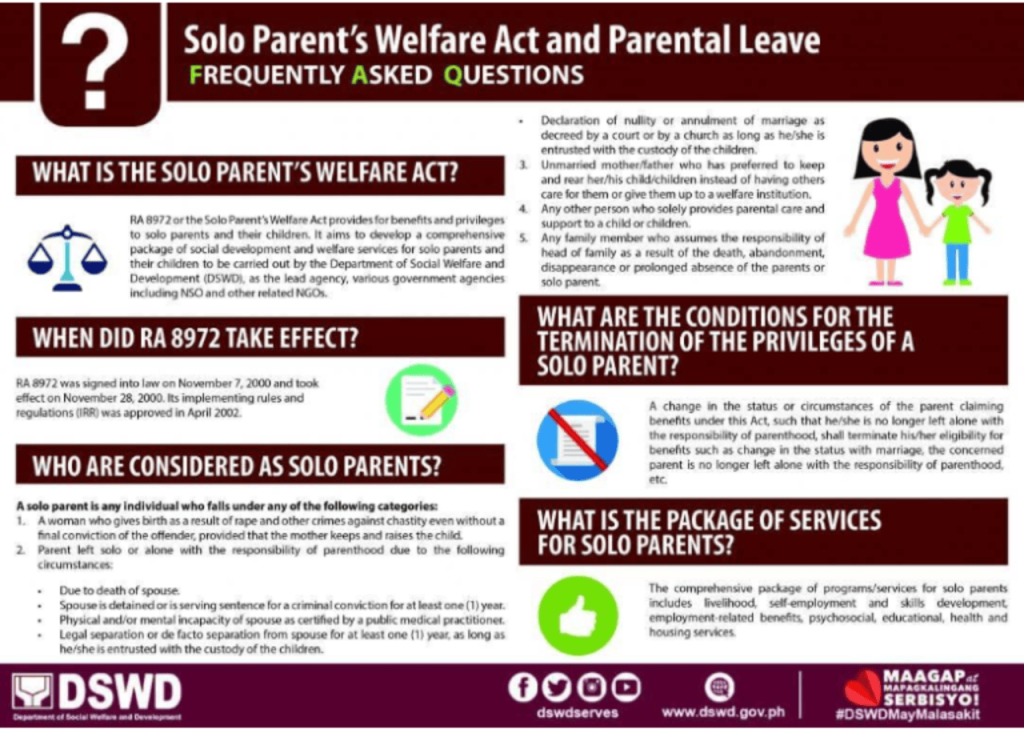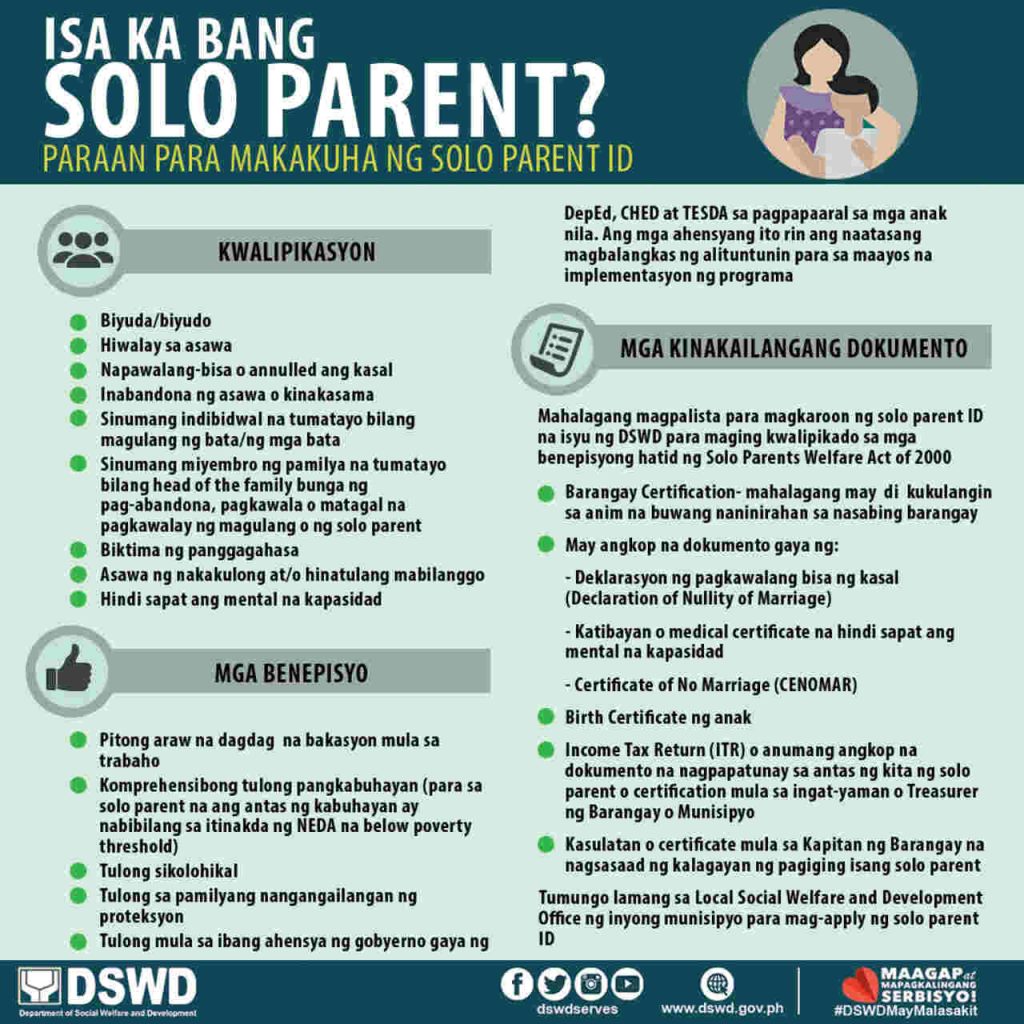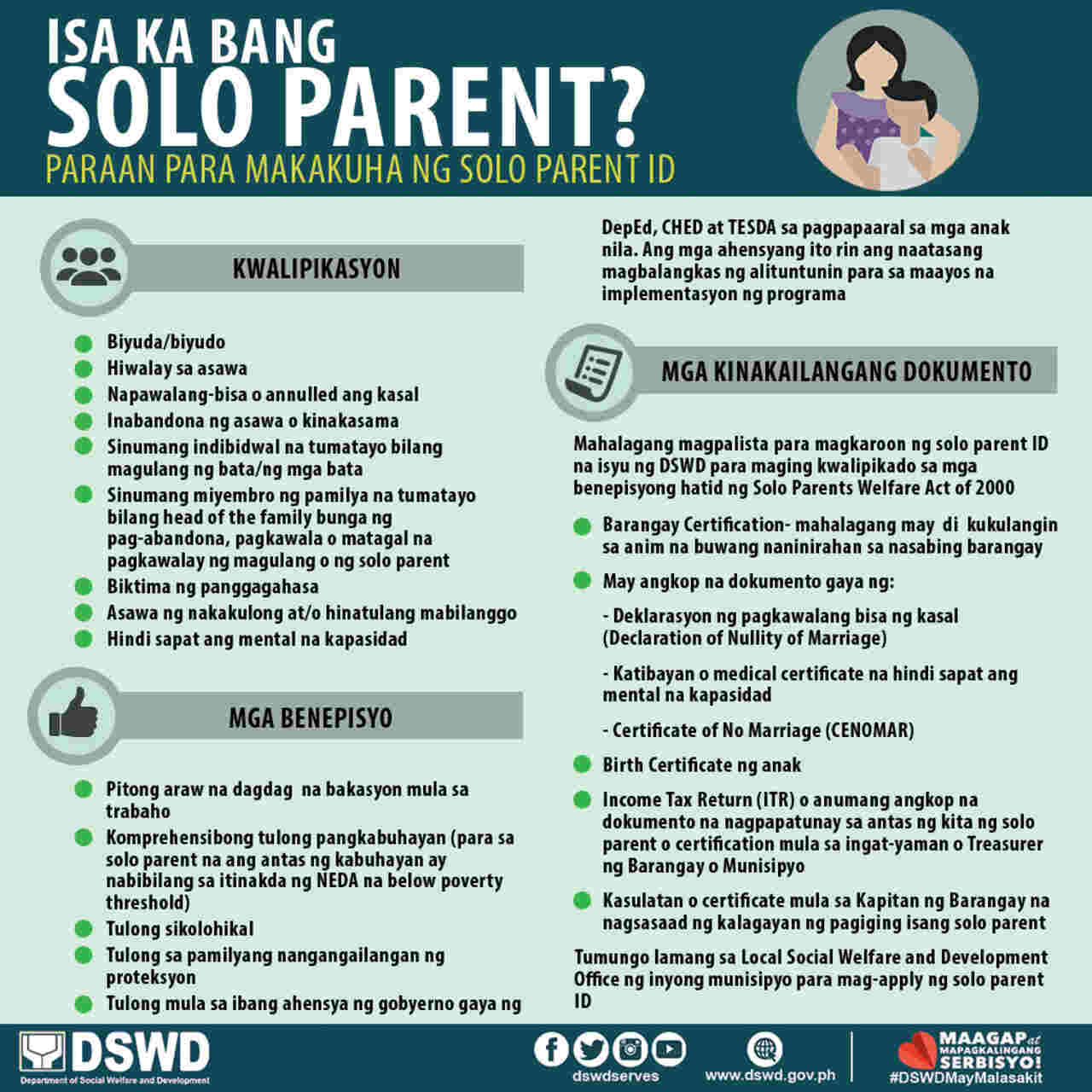The Solo Parent ID issued by the Department of Social Welfare and Development (DSWD) under Republic Act No. 8972, also known as the Solo Parents’ Welfare Act, provides solo parents with valuable benefits and financial assistance to support their families. This ID opens doors to a range of benefits designed to help solo parents overcome challenges in parenting alone. From healthcare assistance to flexible work schedules, the Solo Parent ID recognizes the unique needs of single caregivers.
This guide provides an easy-to-follow process on how to apply for the Solo Parent ID, detailing eligibility criteria, application requirements, and benefits. Learning about this process helps eligible parents understand the opportunities for assistance and services available under the solo parent DSWD program.
Republic Act 8972 and the DSWD Solo Parent ID
Republic Act No. 8972, known as the Solo Parents’ Welfare Act of 2000, provides essential support and benefits to individuals raising children alone in the Philippines. Recognizing the unique challenges of solo parenting, RA 8972 offers assistance that helps these parents meet the financial, health, and educational needs of their families. This law was designed to ensure solo parents receive aid and opportunities to create a stable environment for their children.

A Solo Parent ID, issued under RA 8972 by the DSWD, serves as proof of eligibility for the various benefits provided. Solo parents with this ID can access a flexible work schedule, parental leave, healthcare, and discounts, among other privileges. Through these benefits, the Solo Parent ID helps ease the burden on single caregivers, enabling them to focus on family well-being and growth.
Target Beneficiaries
The Solo Parent ID is designed for individuals who bear the sole responsibility of raising and supporting children due to specific life circumstances. Eligible beneficiaries gain access to various benefits under the Solo Parents’ Welfare Act to aid in their family responsibilities. Below is a list of those who qualify for a Solo Parent ID:
- Parents left alone due to their spouse’s death.
- Parents with a spouse detained or serving a sentence for at least one year.
- Parents whose spouse has a physical or mental incapacity, as certified by a public medical professional.
- Legally separated or de facto separated parents (separated for at least one year) who have custody of their children.
- Parents with a marriage annulment or declaration of nullity and who retain child custody.
- Unmarried mothers or fathers who choose to keep and raise their children.
- Any individual who provides sole parental care and financial support to a child.
- Family members who assume the head of the family role due to the death, abandonment, or absence of the parents.
Benefits
The Solo Parent ID offers several benefits aimed at supporting the economic and social well-being of solo parents. Key advantages include:
- Flexible Work Arrangements: Employers are encouraged to provide solo parents with work schedules that allow them to balance job responsibilities with family duties.
- Parental Leave: Solo parents receive seven additional days of parental leave per year, ensuring they can attend to their children’s needs.
- Educational Assistance: Financial support, including scholarships and educational grants, is available for solo parents’ children.
- Discounts: The Expanded Solo Parents Welfare Act (RA 11861) provides discounts on essential goods at grocery stores, pharmacies, and drug stores.
- Financial Assistance: Qualified solo parents who earn minimum wage are eligible for financial assistance in the form of a monthly cash subsidy of Php 1,000.
Eligibility

To qualify for a Solo Parent ID, applicants must meet certain conditions as defined by RA 8972. A solo parent is any individual who:
- Has experienced rape or other crimes against chastity and has decided to raise the child.
- Is left alone in parenthood due to the spouse’s death, imprisonment, mental/physical incapacity, or one year of abandonment.
- Is separated (legal or de facto) from a spouse for at least one year and has custody of the children.
- Is an unmarried parent who chooses to keep and raise the child independently.
- Provides sole parental support or has assumed head of the family role due to death, abandonment, or disappearance of parents.
Income Criteria for Support
Eligibility for financial and educational assistance under the solo parent DSWD program depends on income level. The National Economic and Development Authority (NEDA) sets a poverty threshold, and solo parents earning below this limit qualify for assistance. DSWD representatives in local areas will assess applicants to confirm eligibility. Solo parents whose income is above the threshold still receive non-monetary benefits like flexible schedules and parental leave.
Conditions for Termination of Solo Parent ID and Benefits
Changes in a solo parent’s life circumstances may result in the termination of their benefits under the Solo Parents’ Welfare Act. When a parent is no longer solely responsible for childcare, their eligibility for assistance is withdrawn.
Below are specific conditions that end eligibility:
- Marriage or remarriage: The solo parent is no longer single or alone in parenting.
- Reunion with spouse: The parent resumes a shared parenting role.
- Child custody change: The solo parent no longer has primary custody of the child.
- Significant changes in financial or caregiving support: Assistance is now provided by another person or entity.
Documentary Requirements
To apply for a Solo Parent ID, and qualify for benefits under the Solo Parents Welfare Act of 2000, applicants must register for a Solo Parent ID issued by the DSWD at the local Social Welfare and Development Office. Below is the list of the required documents:
- Barangay Certification: Proof of residency in the barangay for at least six months.
- Declaration of Nullity of Marriage: Document proving the annulment of marriage, if applicable.
- Medical Certificate: Proof of spouse’s mental incapacity if applicable.
- Certificate of No Marriage (CENOMAR): For unmarried solo parents.
- Child’s Birth Certificate: Proof of dependent child or children.
- Income Tax Return (ITR): Or any document proving the income level, or certification from the Barangay or Municipal Treasurer.
- Certification from Barangay Captain: Statement verifying solo parent status.
Application Procedures
Once all documents are ready, follow these steps to complete the application:
Step 1. Submit the required documents to the local City or Municipal Social Welfare and Development Office (CSWDO or MSWDO).
Step 2. A social worker will review the application, ensuring that all documents are complete.
Step 3. Upon approval, the application is registered in the Solo Parent Registry, and a case number is assigned.
Step 4. The Solo Parent ID is issued within 30 days after filing. This ID is valid for one year and requires annual renewal.
Where to Secure the Application Form
Visit your Local Social Welfare and Development Office (LSWDO) for the application form and to submit your documents for processing.
Video: Steps to Apply for the Solo Parent ID
In this video from Dumaguete com, you can learn the detailed process for applying for a Solo Parent ID, including document preparation, the role of social workers, and every step and tips you need to know to ensure a smooth application process.
Summary
Applying for a Solo Parent ID through the DSWD can provide solo parents with access to essential benefits under RA 8972. From flexible work arrangements to financial support, the ID helps make single parenting more manageable. Eligibility is based on both family circumstances and income, with required documents proving status and income level. By following the outlined application process, solo parents can receive the support they need to raise their children effectively.
